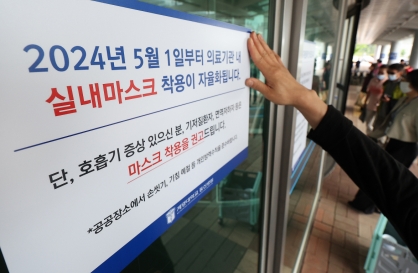Top court orders expenses to be paid for treatment after decision to die with dignity
By KH디지털2Published : Jan. 28, 2016 - 16:11
South Korea’s top court Thursday ruled in favor of a hospital, ordering family members of a now deceased patient, who had refused life-extending treatments, to pay for related medical expenses.
The Supreme Court ruled that the bereaved family of the patient -- the first patient allowed to “die with dignity” in South Korea -- should pay medical expenses totaling 86.4 million won ($71,500) to Yonsei Severance Hospital. She died at the age of 78 in 2010.
This was the second legal dispute between the hospital and the family, who had prompted the country’s first ruling upholding a person’s right to die with dignity in May 2009.
The patient survived 201 more days without a life-prolonging device that was taken off following the ruling the next month.
Yonsei University, operator of the hospital, then lodged a suit against the family, who had refused to pay unpaid medical fees for her treatment. The family had claimed the overall expenses increased due to the hospital rejecting their request to stop the life-extending treatment in time.
The first and second rulings on the case were divided, with the first decision calling on the family to only pay the expenses up until December 2008, when the first ruling was made on the patient’s right to die with dignity. The second ruling sided with the hospital, ordering the family pay the medical expenses in full. It said that the medical contract was still valid even after she was allowed to be taken off the life-sustaining equipment. The amount includes fees for nutritional supplements and antibiotics, but excludes fees for the use of a respirator.
The top court’s decision is expected to serve as administrative guideline in defining the scope of services provided before and after the decision to end life-prolonging treatment, the court’s official said.
With the growing calls for measures to protect terminally ill patients’ rights to choose, the National Assembly passed the “well-dying” bill earlier this month. The bill will enable the patients with no prospects of recovery and their families to choose to die by refusing the life-extending treatment.
According to a survey by the Korea Institute for Health and Social Affairs, 88.9 percent of Koreans aged 65 or older said they would not want to receive life-extending treatments if they knew their illness was incurable.
The law will go into effect in January 2018 after a two-year grace period. By Ock Hyun-ju (laeticia.ock@heraldcorp.com)
The Supreme Court ruled that the bereaved family of the patient -- the first patient allowed to “die with dignity” in South Korea -- should pay medical expenses totaling 86.4 million won ($71,500) to Yonsei Severance Hospital. She died at the age of 78 in 2010.
This was the second legal dispute between the hospital and the family, who had prompted the country’s first ruling upholding a person’s right to die with dignity in May 2009.
The patient survived 201 more days without a life-prolonging device that was taken off following the ruling the next month.
Yonsei University, operator of the hospital, then lodged a suit against the family, who had refused to pay unpaid medical fees for her treatment. The family had claimed the overall expenses increased due to the hospital rejecting their request to stop the life-extending treatment in time.
The first and second rulings on the case were divided, with the first decision calling on the family to only pay the expenses up until December 2008, when the first ruling was made on the patient’s right to die with dignity. The second ruling sided with the hospital, ordering the family pay the medical expenses in full. It said that the medical contract was still valid even after she was allowed to be taken off the life-sustaining equipment. The amount includes fees for nutritional supplements and antibiotics, but excludes fees for the use of a respirator.
The top court’s decision is expected to serve as administrative guideline in defining the scope of services provided before and after the decision to end life-prolonging treatment, the court’s official said.
With the growing calls for measures to protect terminally ill patients’ rights to choose, the National Assembly passed the “well-dying” bill earlier this month. The bill will enable the patients with no prospects of recovery and their families to choose to die by refusing the life-extending treatment.
According to a survey by the Korea Institute for Health and Social Affairs, 88.9 percent of Koreans aged 65 or older said they would not want to receive life-extending treatments if they knew their illness was incurable.
The law will go into effect in January 2018 after a two-year grace period. By Ock Hyun-ju (laeticia.ock@heraldcorp.com)




![[Music in drama] Rekindle a love that slipped through your fingers](http://res.heraldm.com/phpwas/restmb_idxmake.php?idx=644&simg=/content/image/2024/05/01/20240501050484_0.jpg&u=20240501151646)

![[New faces of Assembly] Architect behind ‘audacious initiative’ believes in denuclearized North Korea](http://res.heraldm.com/phpwas/restmb_idxmake.php?idx=644&simg=/content/image/2024/05/01/20240501050627_0.jpg&u=20240502093000)



![[KH Explains] Will alternative trading platform shake up Korean stock market?](http://res.heraldm.com/phpwas/restmb_idxmake.php?idx=644&simg=/content/image/2024/05/01/20240501050557_0.jpg&u=20240501161906)







![[Today’s K-pop] Stray Kids go gold in US with ‘Maniac’](http://res.heraldm.com/phpwas/restmb_idxmake.php?idx=642&simg=/content/image/2024/05/02/20240502050771_0.jpg&u=)